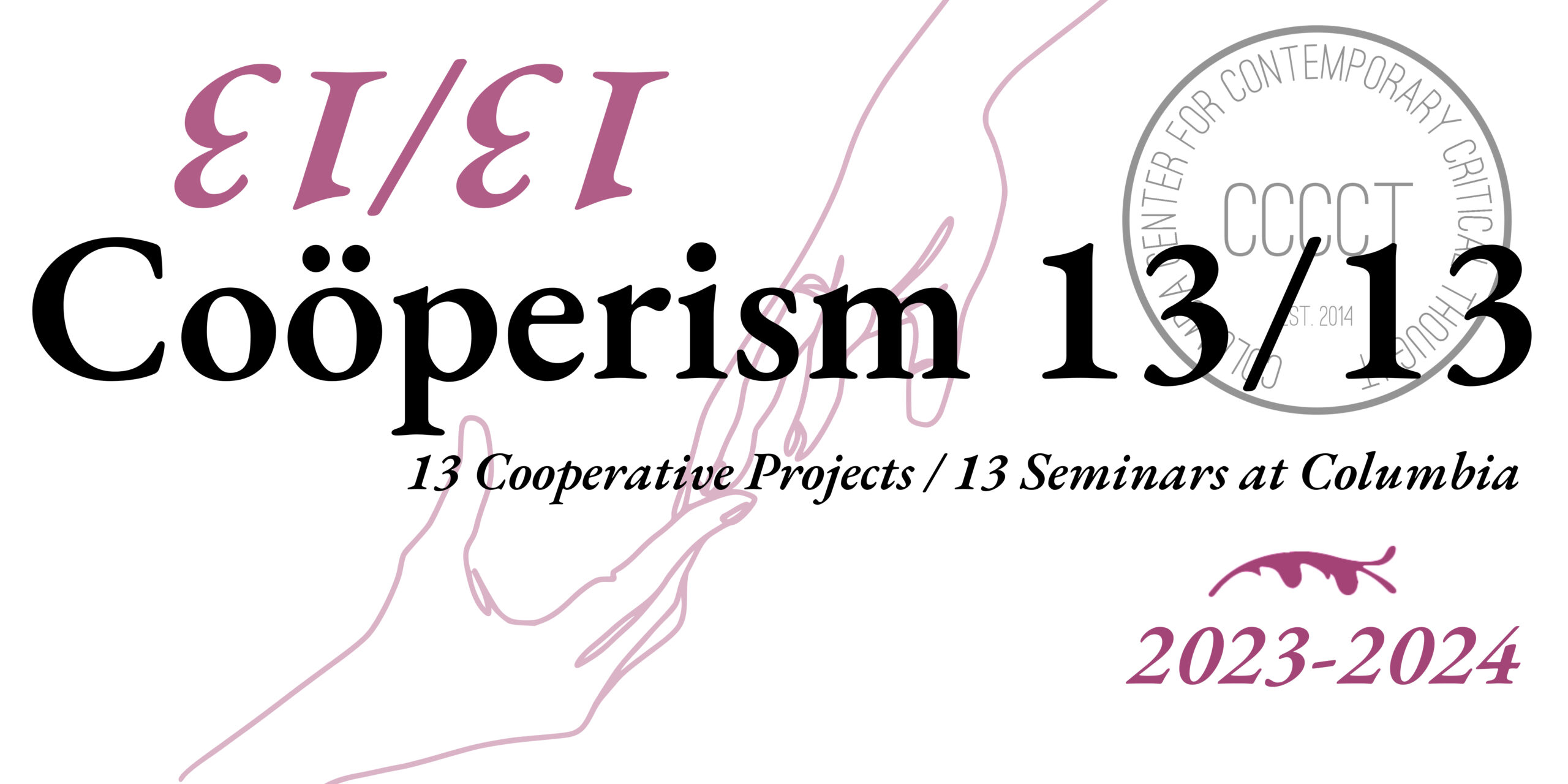Watch Coöperism 8/13 here:
Clara Maier, Jens Meierhenrich, William E. Scheuerman, and Bernard E. Harcourt
discuss
the Frankfurt School critique of State Capitalism and National Socialism
(all readings available on-line here)
Wednesday, December 6, 2023
Columbia University
Any theory of coöperism must understand its principal alternatives: state capitalism, state-centric and state-controlled economies. It is for this reason that Coöperism 8/13 returns to the mid-twentieth century debates over state capitalism, and, more specifically, to the lively debate within a circle of expatriate German thinkers over the rise and establishment of National Socialism under Adolf Hitler. Among these German thinkers were the labor lawyer and political theorist Ernst Fraenkel (1898-1975) and several members of the Institute for Social Research in Frankfurt, including Otto Kirchheimer (1905-1965), Franz Neumann (1900-1954), and Friedrich Pollock (1894-1970), who moved to Columbia University during the war as part of the Frankfurt School in exile.
The rise of National Socialism in Germany during the 1920s and 30s presented a puzzling challenge to the conventional opposition between free market capitalism and state-controlled planned economies. To be somewhat schematic, once Hitler took power, the National Socialist government privatized rather than nationalized financial, banking, and heavy industries, eviscerated labor organizing, and enabled the formation of goliath corporate monopolies, such as the I.G. Farben and the Krupp works, that operated freely but under the thumb of the Nazi state. In effect, Nazi leaders put in place a centralized war economy but allowed private enterprise to do its bidding. As a centralized form of capitalism that included both state planning but also private enterprise, National Socialism defied the dyad of free market vs. government interference that started with the Physiocrats and François Quesnay and extended through invisible hand and laissez-faire economic theories.
Fraenkel, Kirchheimer, Neumann, and Pollock confronted this new and puzzling economic form, National Socialism. They tried to understand its internal contradictions, and it was in that context that they developed and debated how to properly characterize the economic regime—offering terms like “state capitalism,” “state organized private-property monopoly capitalism,” “managerial society,” “administrative capitalism,” “bureaucratic collectivism,” “totalitarian state economy,” “state socialism,” and more.
During a previous 13/13 seminar, Abolition Democracy 6/13, Martin Saar and I began a discussion of the Frankfurt School debates over state capitalism, focusing on the work of Pollock, Neumann, and Theodor Adorno. There are several essays there that help frame this seminar, including a lengthy introduction on Pollock and Neumann, Martin Saar’s synopsis of his argument, an epilogue to the conversation, as well as a recording of the seminar. But we did not broach Fraenkel’s contributions, or those of Kirchheimer. We return now to those debates with a larger field of thinkers.
Our objective in this seminar will be to analyze and assess the model of state capitalism and state-centric economies as a foil to economic regimes that are based on bottom-up (or bottom-down) forms of cooperation. The question we will ask is how the study of state capitalism at mid-century can enlighten our understanding of coöperism.
To discuss these issues, we are honored to be joined by the three leading thinkers on these mid-century debates. Clara Maier is a professor of political theory and of the history of political thought at Columbia University and an expert on the political thought of the Weimar Republic, on the conceptual history of Nazism, and on the writings of Ernst Fraenkel and the Frankfurt School. Jens Meierhenrich is a professor of political theory and international relations at the London School of Economics and here at Columbia Law School, and an expert on Ernst Fraenkel and Nazi law. He is the editor of Fraenkel’s book, The Dual State: A Contribution to the Theory of Dictatorship, and the author of many books, including The Remnants of the Rechtsstaat: An Ethnography of Nazi Law (Oxford University Press, 2018) and The Violence of Law (Cambridge University Press, 2023). His edited collections include The Cambridge Companion to the Rule of Law (Cambridge University Press, 2021). William E. Scheuerman is a professor of political theory and of the history of political thought at Indiana University Bloomington and an expert on German political thought, legal theory, and the Frankfurt School. He is the author of Between the Norm and the Exception: The Frankfurt School and the Rule of Law (MIT, 1994) and of Frankfurt School Perspectives on Globalization, Democracy, and the Law (Routledge, 2008). He is the editor as well of, among other books, From Liberal Democracy to Fascism: Legal and Political Thought in the Weimar Republic (Humanities Press, 2000) (with Peter Caldwell). I could not think of a more extraordinary panel to address the state of the debate on state capitalism at mid-twentieth century.
Welcome to Coöperism 8/13!

